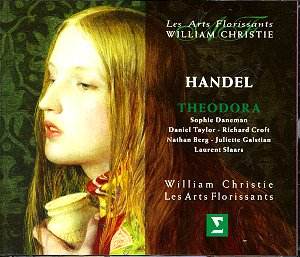Written
in the summer of 1749, Theodora was premiered in London at Covent
Garden Theatre on 16 March 1750. This work, which Handel considered
his finest oratorio, was a failure at first. Handel said bitterly
that the hall was so empty that "there was room enough to
dance there." Part of this failure could be explained by
the earthquake that hit London in February of the same year and
caused the upper classes to flee the city, but another possibility
is that the subject matter of the oratorio - the rebellion of
a woman against the power of the state - was a bit ahead of its
time.
William
Christie's orchestra is as brilliant and petulant as always. The
instrumental balance is ideal, and gives an impression of homogeneity
and equilibrium, and the choir is always transparent and bright.
Countertenor
David Taylor is a disappointment. He is weak and trembly, and
frequently his notes are slightly imperfect. This is all the more
disappointing because Christie conducted Theodora at Glyndebourne,
of which a video exists, with David Daniels, who is riveting.
An addition, the other main competitor on disc - the recording
by Paul McCreesh - features the magnificent Robin Blaze in this
role. Taylor uses too much vibrato for my tastes, and he stumbles
in some of the more difficult passages, such as the long aria
in the second scene The rapture'd soul defies the sword.
Soprano
Juliette Galstein is a revelation - she has a beautifully pure
voice, and can be both subtle and intense, though, again, there's
a bit too much vibrato that distracts from her overall sound.
Soprano Sophie Daneman shows her fine singing here, but again,
vibrato, vibrato, vibrato. Even on brief notes, at time, which
would sound much better without vibrato, she succumbs to the temptation,
whereas sometimes - such as in the aria Angels, ever bright and
fair - her long notes are crystal-clear. Bass Richard Croft -
an alumnus of Christie's Glyndebourne production - gives a fine
performance, and in this work the bass has an important role with
many attractive arias.
You've
certainly understood that I don't like vibrato. That's not entirely
true; vibrato as an ornament is fine, but when singers of this
quality use it so often it gets plain annoying. It's not that
they are not capable of singing without it; it's just that, for
some reason, they feel it is necessary. While the orchestra plays
without vibrato - in the style of Handel's time - why can't the
singers do so as well? David Taylor gives a perfect example of
ornamental use of vibrato in the opening notes of Kind Heav'n,
if virtue be thy care, where he uses tasteful vibrato in his long,
drawn-out notes. But as he goes on in the song, he tries to fit
as many vibrations as he can in some of the shorter notes.
But
when you reach the final chorus, you cannot but be moved by the
three hours of music that went before. The sum of this exceeds
the parts, and, while there are some weaknesses in the soloists,
they end up coming together in an exemplary fashion, and providing
a delightful recording. While the McCreesh recording may be better
- better sound, more subtle orchestral playing, and Robin Blaze
- this new set stands up well to the competition.
Kirk
McElhearn

